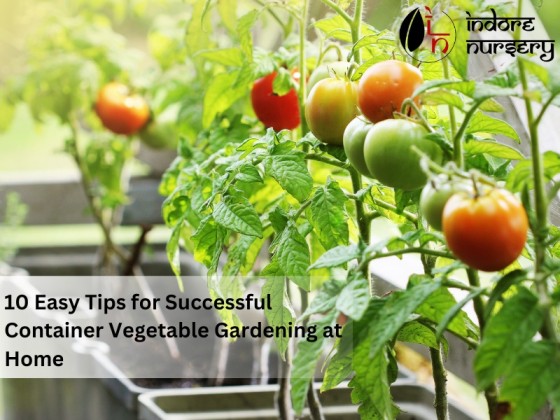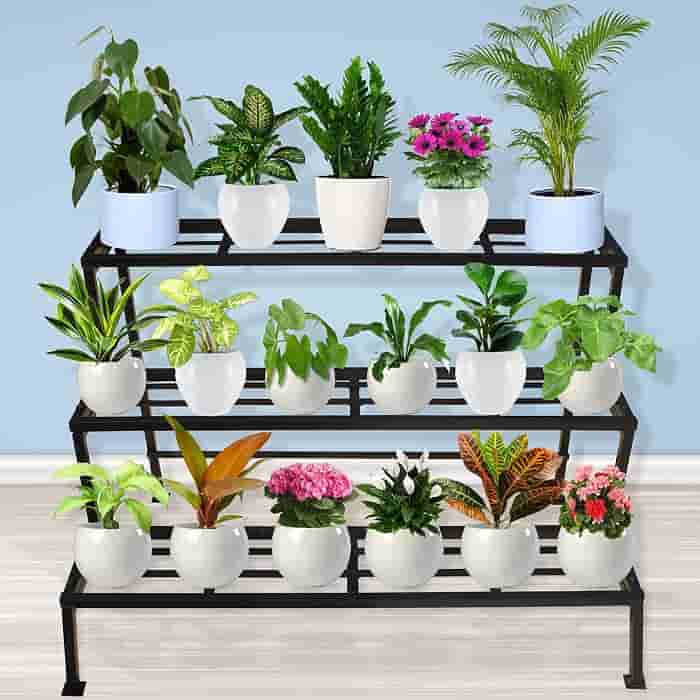Container vegetable gardening is a wonderful way to grow fresh food. This has been ideal for those who have limited space or time but would like to have a garden. Since the use of containers in growing vegetables allows a person to manage their garden. Here are ten easy tips to help you succeed with container vegetable gardening at home.
Choose the Right Containers
The first step to a healthy garden is by selecting containers. The size of the containers will determine which vegetables you can grow in them. For example, small plants like herbs grow well in shallow pots. Other plants whose root systems run deep, such as tomatoes, require deep container spaces. Always ensure that the container has holes at the bottom to avoid waterlogging, which may rot roots and hence cause failure in the plant.
Select the Best Soil Mix
An adequate potting mix is necessary for proper container gardening. Compared to ordinary garden soil, a potting mix is light and also drains well. This will make your plants grow stronger and healthier. Avoid using the regular garden soil. Most of the time, this type of soil is wet, compacted, and sometimes gets the tendency to smother the roots of your plants, which may lead to poor growth. Mixing in compost or organic matter for enriching the soil will result in a better outcome.
Position Your Containers in a Sunny Spot
Various vegetables have diverse sun requirements. Most need at least 6 hours a day of direct sun. Select a balcony, patio, or terrace to place your containers. Do not place containers where structures or trees will shade them. If plants are not receiving sufficient sunlight, they will grow slower or produce less fruit.
Pick the Right Vegetables for Containers
Not all vegetables are good for container growing. Some plants take better containers than others. However, tomatoes, peppers, spinach, and lettuce are excellent choices. In choosing plants, also note your climate. Seasonal plants in Indore can be good examples of vegetables that adjust well to particular types of weather. They will grow better and produce more.
Water Your Plants Regularly
Another extremely important component of container gardening is the watering. Containers dry faster compared to regular garden beds, usually much faster. So you need to water often. Moreover, do not overwater since it might lead to root rot. A simple way of testing moisture is by poking your finger an inch into the soil. Therefore, if it feels dry it is time for watering. Watering during early morning and late evening time is better so that one avoids evaporation.
Use Fertiliser for Healthy Growth
Therefore, these containers have very low nutrient levels and require supplemental feeding. Use good quality fertilisers to ensure the vegetables are good. Slow-release fertiliser is the best since it will provide nutrients to the vegetables over time. Additionally, you can use organic compost to enhance the growth of your plants. If you fertilise them two weeks in a row, then your vegetables will be healthy and productive.
Prune and Support Your Plants
Pruning will help promote plant health and increase yields. Remove dead or yellowing leaves regularly to encourage new growth. For tall growers like tomatoes, provide staking or cages to keep plants upright. Moreover, providing support also helps vegetables avoid falling over and breaking under their weight. Pruning and supporting correctly provides for healthy vegetables during your growing season.
Rotate Your Containers for Even Sun Exposure
Plants tend to grow towards light, which makes them grow unevenly. Rotate your containers weekly so that all sides of the plant receive equal sunlight. Thus, this will deny the possibility of your plants becoming lopsided, and they will grow uniformly.
Protect Your Plants from Pests
Like in a traditional garden, pests may pose a challenge in container gardening. Observe the insects and pests that may destroy your plants. You can treat using neem oil or soapy water, which are homemade pest controls. Check your plants from time to time to observe the damage that may have been done. The early detection of pests will ensure that they do not spread and create damage in your entire garden.
Choose the Right Time for Planting
Knowing the right time to plant your vegetables is important. It may grow poorly or have a weak harvest if planted at the wrong time. It will always be best to plant based on what applies in your region. The best plant nursery in Indore will tell you when to plant your vegetables. They most often offer useful advice and recommendations to local gardeners. Planting vegetables at the right time ensures they grow under optimal conditions.
Conclusion
Container vegetable gardening is one of the most rewarding and fun ways of growing your food. Whether you’re an experienced grower or are just a newcomer, these ten tips will make sure that success is forthcoming. Choosing the right containers, protection from pests, and other steps have to be taken to ensure success in container vegetable gardening. Additionally, you could visit biggest nursery in Indore to acquire the right plants and supplies.
Remember to select your vegetables based on your climate and space. For example, seasonal plants suitable for Indore will fit the location just fine. These will naturally do good without much attention and give you a good yield. Furthermore, always ensure that your plants receive regular water supply, lots of sunlight, and quality fertilisers. Fresh, home-grown vegetables from your container garden can be within your grasp. Happy gardening!










Recent Comments